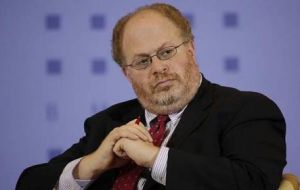MercoPress. South Atlantic News Agency
Bank of England decision on further liquidity injection expected for February
 MPC member Adam Posen has been voting in favour of an extra £ 50 billion QE
MPC member Adam Posen has been voting in favour of an extra £ 50 billion QE The Bank of England’s monetary policy committee (MPC) voted Thursday to hold the base interest rate at its record low of 0.5%. As expected, the Bank did not extend its £200 billion program of quantitative easing and is not expected to make a decision on whether to follow the US Federal reserve with a second bout of economy boosting bond-buying – or QE2 – until February.
It is thought likely that the nine members of the Bank’s rate-setting committee will have ended their two-day meeting in the same way they did in recent months; divided three ways with the majority wanting policy kept on hold, one member voting for an extension of quantitative easing and another for interest rates to rise.
Since June, MPC member Andrew Sentance has been voting in favour of raising interest rates from 0.5% to 0.75%. Meanwhile, at the MPC meetings in October and November, Adam Posen voted in favour of £50bn of extra QE. The minutes of the meeting will be published on Wednesday 22 December.
Last month’s widely-anticipated US Federal Reserve move to pump a further 600 billion US dollars into the economy increases pressure on the Bank of England to extend its own stimulus measures. Set up against this though is above target inflation and an improving economic picture in the UK, with two quarters of better than expected economic growth.
The most recent figures showed that Consumer Prices Index (CPI) inflation rose to 3.2% in October, well above the target rate of 2%. Furthermore as of January first VAT rises to 20% from 17.5%.
Two separate private business surveys suggest the manufacturing sector is growing at its fastest rate for around 16 years, as private sector employment continues to recover. Exporters are also beginning to take advantage of the lower levels of Sterling which is coinciding with the recovery in global trade.'
Most economists do not expect a rise in the base rate until the second half of 2011, meaning savers will continue to get paid tiny returns on their cash.
The previous change in Bank Rate was a reduction of 0.5 percentage points to 0.5% on 5 March 2009. A program of asset purchases financed by the issuance of central bank reserves was initiated on 5 March 2009. The most recent change in the size of that program was an increase of £25 billion to a total of £200 billion on 5 November 2009.
“The Bank will continue to offer to purchase high-quality private sector assets on behalf of the Treasury, financed by the issue of Treasury bills, in line with the arrangements announced on 29 January 2009”, says the BoE website.




Top Comments
Disclaimer & comment rules-

Read all commentsfurther liquidity injection = print, print and print more money from nowhere, Brilliant.
Dec 10th, 2010 - 03:06 am 0Commenting for this story is now closed.
If you have a Facebook account, become a fan and comment on our Facebook Page!